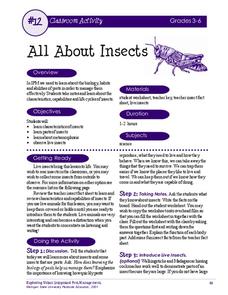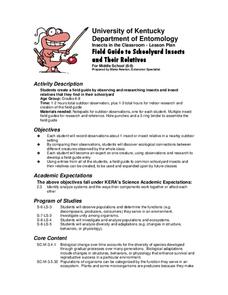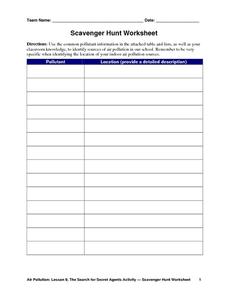Scholastic
Minibeasts
Lead young scientists to discover insects outdoors. After investigating, students will record observations, learn about these fascinating creatures, craft, and role play.
Michigan State University
All About Insects
Insects are the focus of an activity that looks deep into the anatomy and metamorphosis of everyday bugs. Two worksheets reinforce knowledge obtained through a teacher-guided grand conversation and insect observation.
Curated OER
Insects?
Can you tell the difference between a bug and an insect? Aren't they the exact same thing? Let your learners explore, identify, classify, and document the differences they see in bugs and insects. The activity sheet suggests several...
Curated OER
Torn Insect Art
Sometimes the best way to drive home a concept is through an art project. Here is a quick and easy activity that can help learners remember or become more familiar with the parts on an insect's body. They tear brightly colored paper into...
Curated OER
Field Guide to Schoolyard Insects and Their Relatives
Your entire class works together to create an illustrated insect field guide. The intent is that they venture outside of the classroom, find a critter, and then research it using reference materials, insect books, and the Internet for...
Curated OER
Bugs
This is not just a worksheet, but an entire set of activities and worksheets that can accompany any unit on bugs or insects. Little learners will hone early math and literacy skills as they create mini-books, discriminate between big and...
New South Wales Department of Education
Invertebrates
Of all invertebrates, insects by far are the most numerous. Scholars discuss invertebrates and then use a key to classify them. They see different examples and must describe features of each organism based upon the key.
Howard Hughes Medical Institute
The Mosquito Life Cycle Activity
Understanding the life cycle of a mosquito helps us understand how to prevent the spread of diseases they carry. A lab investigation provides learners with the opportunity to track the two-week life cycle of the mosquito. Scholars make...
Michigan State University
Inspecting The School
Keep your eyes peeled for pests! Here, scholars inspect their campus for signs of living things such as insects and rodents. Upon observation, class members record their findings and present the information to their peers.
Museum of Science
Nature Bingo
Hit the jackpot by playing nature bingo. Scholars go on a nature walk and record observations in their notebooks. They see how many types of trees and insects they observe and play a nature bingo game where they find different natural...
National Park Service
The Young Naturalist
Beginning with a brief history of our 26th president, Theodore Roosevelt, then followed by a discussion of his interest in nature, young scientists take to the outdoors to locate and observe local plants and insects. Scholars return to...
American Museum of Natural History
Draw a Monarch
Five steps walk scholars through the process of drawing a Monarch butterfly. Participants research the insect, make observations, trace, then color.
New South Wales Department of Education
Photosynthesis
Venus fly traps photosynthesize and consume insects because the soil they live in does not provide enough nutrients. Scholars analyze historical scientific experiments to learn how scientists discovered photosynthesis. From their...
Shmoop
ELA - Literacy.CCSS.ELA-Literacy.RST.9-10.6
Key to understanding scientific or technical texts is identifying the underlying question the author is attempting to answer. Provide your young scientists with an opportunity to practice identifying these questions and the procedures...
Curated OER
Bee Pollen Popular
The world would be a much different place without the help of pollinators. Read about the important role bats, hummingbirds, and various insects play in plant reproduction, exploring the interdependence of living things in an ecosystem....
Alachua County Public Schools
Food Chain
Two to four players receive seven cards each, with plants, animals, or nitrates depicted. They place what they have onto their own empty game board with the objective to complete a food chain. The game is a fun way to reinforce learning...
Teach Engineering
Bees: The Invaluable Master Pollinators
There is nothing in the world quite like a bee. Here is a video that explains the importance of bees to pollination. Scholars consider possible solutions to the declining population of bees in the ninth and final installment in the series.
Curated OER
Scavenger Hunt Worksheet
Exactly how environmentally friendly is your school? From the air fresheners in the bathrooms to the cleaning solvents used in the classrooms, young conservationists search the school grounds for sources of air pollution in...
National Wildlife Federation
Habitat Web
Young scientists weave together an understanding of ecosystems with this fun collaborative activity. Taking on the roles of different living and non-living elements of specific habitats, learners use a ball of yarn to create the web of...
Howard Hughes Medical Institute
Tracking Genetically Modified Mosquitoes
What's that buzzing in your ear? An insightful lesson about genetically modified mosquitoes! Partnered pupils explore the creation, release, and monitoring of mosquitoes designed to reduce the mosquito population. After watching a video,...
Howard Hughes Medical Institute
Battling Vector-Borne Diseases: Factors That Affect the Mosquito Life Cycle
Slow the spread of disease by slowing disease carriers in their tracks. Learners explore just how they might accomplish this as they experiment with the life cycle of a mosquito under different conditions. Scholars design and conduct...
Michigan State University
Wanted Dead or Alive
Wanted! Pests are on the loose! Here, class members create a wanted poster highlighting one pest. Posters includes a picture, description, and signs of pest activity.
University of Waikato
Observing Water's Thin 'Skin'
Keep the tension up in the classroom. The class first observes as the teacher creates a dome of water above a glass by adding paperclips into an already full glass. Classmates then work in pairs to see how many drops of water can fit...
Michigan State University
May I Take Your Order?
If you're a pest, come and get a tasty meal here! Scholars work collaboratively to construct a mini restaurant out of a shoe box and create a menu that feeds a pest their favorite food.
Other popular searches
- K 2 Life Science Insects
- Science Insects
- Parts of Insects Science
- Life Science Insects
- Science Spiders vs Insects
- Esl Lessons Science Insects
- Esl Science Insects

























